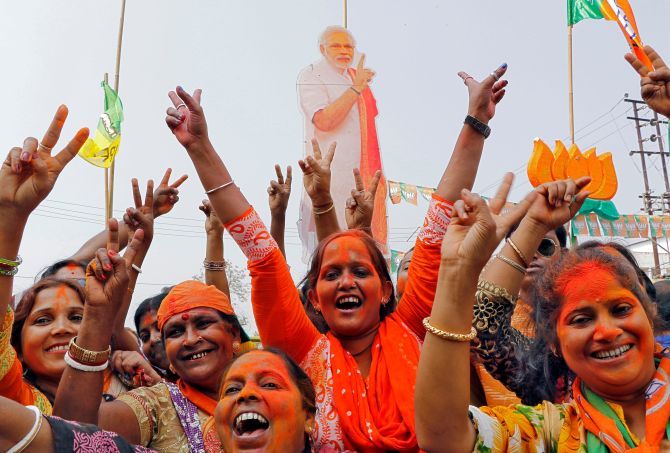It appears that the BJP government has succeeded in managing the communication of the PNB scam in a manner that its adverse impact on its electoral fortunes is largely contained, says A K Bhattacharya.

Photograph: Jayanta Dey/Reuters
On February 14, the Nirav Modi scam hit the nation. India's second largest state-controlled lender, Punjab National Bank, informed the Bombay Stock Exchange that it had detected some ‘fraudulent and unauthorised transactions’ pertaining to the letters of undertaking it had issued at an estimated value of over Rs 11,380 crore.
The amount involved was later revised to Rs 12,703 crore as more such transactions came to light.
Companies owned by billionaire Nirav Modi, a luxury diamond jewellery designer, and his uncle, Mehul Choksi, were alleged to have used these LoUs, obtained without any guarantee, to fund their businesses.
Several days before these ‘fraudulent’ transactions came to light and PNB’s stock prices fell sharply, Modi and Choksi had left India.
Even as law enforcement agencies began seizing assets belonging to them, it became clear that the Narendra Modi government was dealing with its biggest financial sector scam.
Newspapers on February 15 front-paged this news with a display that reminded you of other major financial scams of yesteryear -- involving Harshad Mehta and Ketan Parekh.
On February 18, elections were held in Tripura. In the fray were the Left Front, which was seeking re-election for the fifth time in a row, and the Bharatiya Janata Party, which had allied with a local party by the name of Indigenous People’s Front of Tripura.
Left Front was led by Manik Sarkar, who led Tripura as chief minister for about two decades and made a reputation for himself as a man of honesty and integrity.
Prime Minister Narendra Modi also left no stone unturned by campaigning hard in Tripura to defeat the Left Front.
Almost 10 days later, assembly elections were held in two other north-eastern states -- Meghalaya and Nagaland.
In these elections also, the BJP was seeking to establish its rule in the two states, mainly through alliances with regional parties.
The results declared on March 3 showed that the BJP has overthrown the Left Front and its ‘honest’ chief minister.
In Nagaland, it switched over to a new regional party and formed an alliance that won the necessary number of seats to be part of the government.
And in Meghalaya, it ensured that the Congress would not be able to form a government on its own and stitched together a post-poll alliance to stake claim to form a government.
What does this mean for the time-honoured belief that financial scams can prove to be a liability for any political party seeking popular mandate in an election?
Remember that corruption was one of the issues that the BJP used effectively to overthrow the Congress in the general elections in 2014. So, did the BJP manage to get away easily in spite of its government at the Centre being accused of having allowed the PNB scam and letting the accused leave the country?
Here was a squeaky clean chief minister of a state seeking re-election for the fifth time. And the BJP, who was hoping to defeat him, had just been accused of having failed to prevent the PNB scam.
It is possible that voters are discerning enough to differentiate between the responsibilities of a ruling party at the Centre with those of a party that hopes to form a government in a state.
The issues in a state election are different, as indeed they were in Tripura, Meghalaya and Nagaland. Voters there were more concerned about issues about regional autonomy, development or greater say in governance.
A financial sector scam involving a state-controlled bank and the failure of the Union government or the regulator to prevent it may not have become an election issue.
There is another explanation of why the link between a financial scam and outcomes in state elections has become tenuous.
It appears that the BJP government has succeeded in managing the communication of the PNB scam in a manner that its adverse impact on its electoral fortunes is largely contained.
The Congress or the Left Front, too, failed to drive home the electoral advantage from the PNB scam and they must examine what could have gone wrong.
Simultaneously, the BJP government at the Centre also worked hard to devise a series of administrative responses to counter the negative impact of the PNB scam.
While the law enforcement agencies were made to work overtime to initiate action against the offenders and seize the assets of those who may have run away from the country, the government decided to set up a new independent regulator for audit firms and frame new laws targeted at fugitive economic offenders.
In many ways, the biggest relief for the BJP after the election results is that it succeeded in preventing the PNB scam from adversely impacting its electoral prospects in the three north-eastern states.
Or has the link between scams and electoral outcomes become tenuous?










